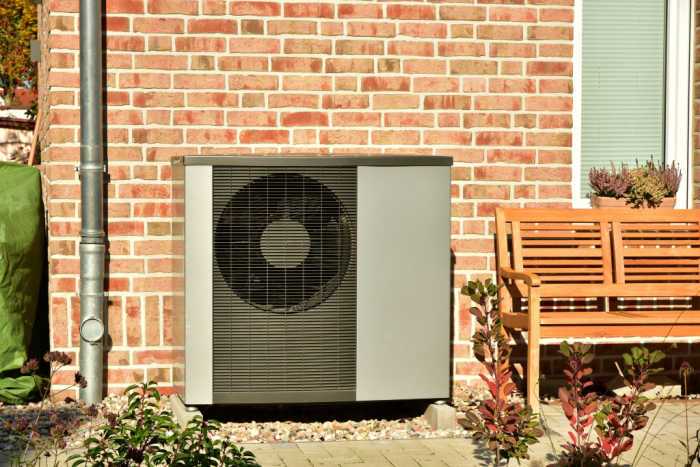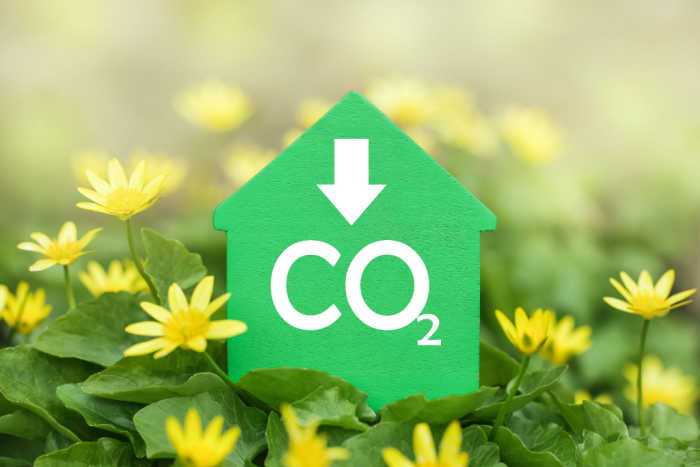The fossil fuels used in our homes account for more than one fifth of the UK’s carbon emissions, and currently, 85% of households remain reliant on natural gas boilers for their heating.
We already know that gas boilers and other forms of fossil fuel heating will be banned in domestic new builds from 2025 as part of the Future Homes Standard, but what about existing properties?
As the effects of climate change become more prevalent, more and more homeowners are taking note of their carbon footprint and opting for alternative heating systems. Then of course there’s the soaring cost of energy, further prompting us to consider and change our consumption.
If you’re looking to replace your current heating system, an air source heat pump could be a valid option.

Air source heat pumps (ASHPs) come in two variations. The most common type installed in the UK is the air-to-water heat pump. These systems absorb heat from the outside air, compress it to reach a higher temperature and feed it into your wet central heating system.
ASHPs give out heat at lower temperatures over longer periods of time compared to traditional boilers, making air-to-water heat pumps more suitable for underfloor heating systems or larger radiators.
Another type of ASHP is the air-to-air heat pump. These systems transfer heat from the outside air to air inside your home, increasing the temperature of the air in each room. This warm air enters your home through a series of fan coil units, or ‘blowers’.
The value of an air source heat pump can vary significantly. It all depends on the specific circumstances surrounding the installation, such as the age and condition of the property and the heating system the ASHP will replace.
Here’s a closer look at the key reasons why an air source heat pump might be a good investment.
Older, traditional heating systems are often inefficient and poorly controlled. An ASHP that is professionally designed and properly installed could bring significant savings in the long run thanks to its greater energy efficiency.
ASHPs do require electricity to run, but use less energy than the heat they produce. The efficiency of a heat pump is measured by its Seasonal Coefficient of Performance (SCOP) - the ratio of heat produced per unit of electricity consumed. For example, a SCOP value of 3 means you get 3kWh of heat output for every 1kWh of electricity used.
On average, an ASHP is 300% more efficient than a gas boiler.
Then there’s the cost of energy to consider. The price of wholesale gas has risen by over 400% in the last 12 months, and according to the independent Climate Change Committee the average price of gas will be 50% higher in 2030.
At the same time, the National Infrastructure Commission predicts the cost of electricity could drop by 58%. Of course we can’t be certain of what the future holds, but if the price of gas does continue to rise exponentially and electricity falls, ASHPs will indeed bring significant savings over gas boilers.

Increased efficiency translates to a lower carbon footprint. With an ASHP installed your household will be responsible for significantly less carbon dioxide emissions than if you were running a traditional gas boiler.
According to the Energy Saving Trust, you’ll be able to remove 2.6 tonnes of greenhouse gas emissions from your yearly total by replacing your gas boiler with a heat pump - reducing your annual carbon footprint by 44%.
If your electricity comes from a renewable source then carbon emissions can be reduced to zero.
To encourage the installation of low carbon heating systems, the Government has made certain grants available through the Boiler Upgrade Scheme. This includes £5,000 off the cost and installation of an air source heat pump.
To be eligible you must own your property, and the proposed ASHP must:
The Boiler Upgrade Scheme is open to domestic and small non-domestic properties in England and Wales until 2025.
In addition, the 2022 Spring Statement introduced a rate of 0% VAT on the installation of domestic ASHPs.
Despite their many benefits, heat pumps are not suited to every building. If your property is poorly insulated you’ll lose much of the heat generated, counteracting your system’s efficiency. Of course this is true of any heating system, but because ASHPs work at a lower temperature good insulation is more critical.
If you’re opting for an air-to-water heat pump, the lower heat supply also means you’ll need larger heat emitting surfaces to really feel the benefits.
If you’re still unsure about whether or not an ASHP is the right choice for you, take a look at our top 9 air source heat pump FAQs. Alternatively, contact us to discuss your options and we’ll help you make an informed decision on your investment.
